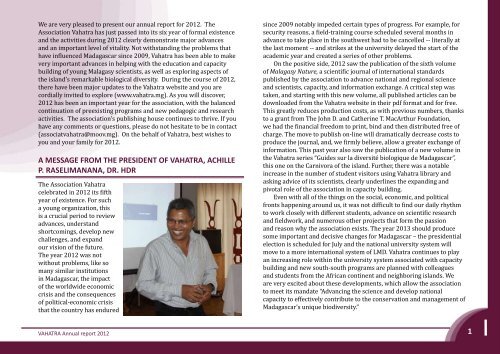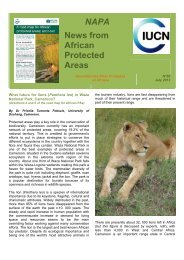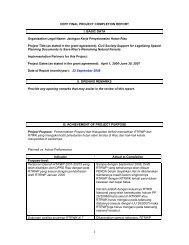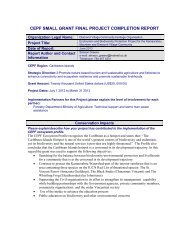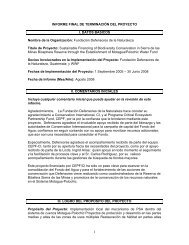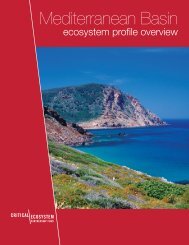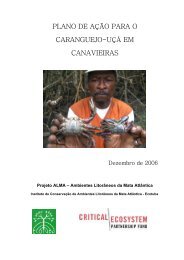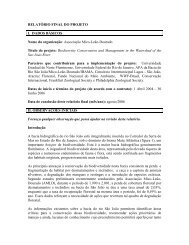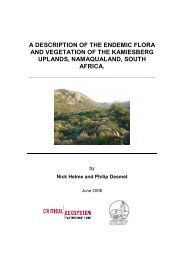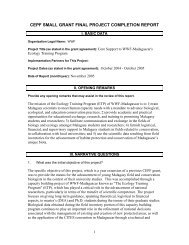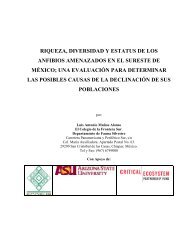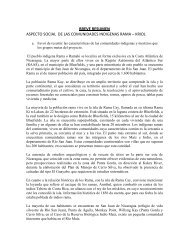2012 Vahatra Annual Report - Critical Ecosystem Partnership Fund
2012 Vahatra Annual Report - Critical Ecosystem Partnership Fund
2012 Vahatra Annual Report - Critical Ecosystem Partnership Fund
Create successful ePaper yourself
Turn your PDF publications into a flip-book with our unique Google optimized e-Paper software.
We are very pleased to present our annual report for <strong>2012</strong>. The<br />
Association <strong>Vahatra</strong> has just passed into its six year of formal existence<br />
and the activities during <strong>2012</strong> clearly demonstrate major advances<br />
and an important level of vitality. Not withstanding the problems that<br />
have influenced Madagascar since 2009, <strong>Vahatra</strong> has been able to make<br />
very important advances in helping with the education and capacity<br />
building of young Malagasy scientists, as well as exploring aspects of<br />
the island’s remarkable biological diversity. During the course of <strong>2012</strong>,<br />
there have been major updates to the <strong>Vahatra</strong> website and you are<br />
cordially invited to explore (www.vahatra.mg). As you will discover,<br />
<strong>2012</strong> has been an important year for the association, with the balanced<br />
continuation of preexisting programs and new pedagogic and research<br />
activities. The association’s publishing house continues to thrive. If you<br />
have any comments or questions, please do not hesitate to be in contact<br />
(associatvahatra@moov.mg). On the behalf of <strong>Vahatra</strong>, best wishes to<br />
you and your family for <strong>2012</strong>.<br />
A MESSAGE FROM THE PRESIDENT OF VAHATRA, ACHILLE<br />
P. RASELIMANANA, DR. HDR<br />
The Association <strong>Vahatra</strong><br />
celebrated in <strong>2012</strong> its fifth<br />
year of existence. For such<br />
a young organization, this<br />
is a crucial period to review<br />
advances, understand<br />
shortcomings, develop new<br />
challenges, and expand<br />
our vision of the future.<br />
The year <strong>2012</strong> was not<br />
without problems, like so<br />
many similar institutions<br />
in Madagascar, the impact<br />
of the worldwide economic<br />
crisis and the consequences<br />
of political-economic crisis<br />
that the country has endured<br />
since 2009 notably impeded certain types of progress. For example, for<br />
security reasons, a field-training course scheduled several months in<br />
advance to take place in the southwest had to be cancelled -- literally at<br />
the last moment -- and strikes at the university delayed the start of the<br />
academic year and created a series of other problems.<br />
On the positive side, <strong>2012</strong> saw the publication of the sixth volume<br />
of Malagasy Nature, a scientific journal of international standards<br />
published by the association to advance national and regional science<br />
and scientists, capacity, and information exchange. A critical step was<br />
taken, and starting with this new volume, all published articles can be<br />
downloaded from the <strong>Vahatra</strong> website in their pdf format and for free.<br />
This greatly reduces production costs, as with previous numbers, thanks<br />
to a grant from The John D. and Catherine T. MacArthur Foundation,<br />
we had the financial freedom to print, bind and then distributed free of<br />
charge. The move to publish on-line will dramatically decrease costs to<br />
produce the journal, and, we firmly believe, allow a greater exchange of<br />
information. This past year also saw the publication of a new volume in<br />
the <strong>Vahatra</strong> series “Guides sur la diversité biologique de Madagascar”,<br />
this one on the Carnivora of the island. Further, there was a notable<br />
increase in the number of student visitors using <strong>Vahatra</strong> library and<br />
asking advice of its scientists, clearly underlines the expanding and<br />
pivotal role of the association in capacity building.<br />
Even with all of the things on the social, economic, and political<br />
fronts happening around us, it was not difficult to find our daily rhythm<br />
to work closely with different students, advance on scientific research<br />
and fieldwork, and numerous other projects that form the passion<br />
and reason why the association exists. The year 2013 should produce<br />
some important and decisive changes for Madagascar – the presidential<br />
election is scheduled for July and the national university system will<br />
move to a more international system of LMD. <strong>Vahatra</strong> continues to play<br />
an increasing role within the university system associated with capacity<br />
building and new south-south programs are planned with colleagues<br />
and students from the African continent and neighboring islands. We<br />
are very excited about these developments, which allow the association<br />
to meet its mandate “Advancing the science and develop national<br />
capacity to effectively contribute to the conservation and management of<br />
Madagascar’s unique biodiversity.”<br />
VAHATRA <strong>Annual</strong> report <strong>2012</strong> 1


